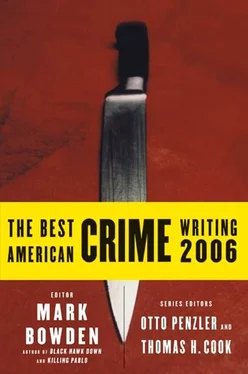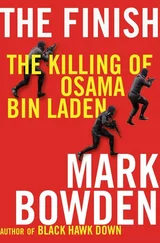"It made me feel awful," he says, pulling his knees up to his chest. "It became sort of this thing that I couldn't control, and I'd literally want to throw up afterward… I was pretty convinced that it was some kind of demonic possession, almost. I mean, I can remember several times after the event where I'd get gas for the car and it would be, like, sixteen dollars and sixty-six cents."
At one point, Hardwicke concluded he was gay and announced he was leaving Terri. But a friend who knew of his experiences suggested he seek therapy instead. Because he felt complicit in the acts, he didn't think of them as molestation. But his therapist, Dr. Emily Samuelson, a trauma specialist, disagreed with that assessment.
Within twenty-four hours after Hardwicke told Samuelson about being raped by the school's cook, Hardwicke's mother was killed in a car accident, propelling his paranoia to imponderable heights. His daughter was in the car, too, but she "walked out unscathed," he says. "And I got to thinking later it was a metaphor for molestation. Some are killed, some are scarred, some are crippled. Others walk out untouched. It all depends where you were sitting in the car."
After a few months of seeing Samuelson, in 1999, Hardwicke decided to approach the school and asked his father to help him do it. Hardwicke's father, who by then had become Maryland 's chief administrative law judge, is a faculty member at Johns Hopkins. So they arranged to meet the school's then-president, John Ellis, at the Hopkins Faculty Club. Ellis arrived with the school's attorney. Up to that point, Hardwicke had never contemplated suing the school. "My intention was to have them apologize," he explains. "I was trying to have somebody say,'It's not your fault.' "
Hardwicke takes a long, deep drag on his cigarette. After several months of back-and-forth, he realized that no apology would be forthcoming and decided to explore a lawsuit. His father contacted some friends of his at Piper Rudnick, the largest law firm in Maryland, where he had briefly been an associate in the fifties.
Assigned to handle the litigation was an earnest, thirty-three-year-old, chubby-cheeked associate, Keith Smith, who was startled by the depths of Hardwicke's depression when they first met in late 2000."I've never seen anyone as black as John was," Smith tells me. "He couldn't work, couldn't get out of bed most days."
Not long after the firm signed on, the school made a settlement offer of two hundred thousand dollars. Hardwicke considered the sum "insulting."
I ask him if he can quantify the damages he's suffered. His back stiffens, face reddens, voice rises an octave or two.
This is what bothered me so much about filing a lawsuit. The first thing Piper Rudnick wanted to do was create a list of ways that I'd been damaged.And I'm just, like, fucking unwilling to do this.What do you mean create a list? I'm not going to give you a list… because I can't. I know I've been changed, hurt unbelievably. There's not a moment that goes by that I haven't been affected by this. Mr. Hanson used to masturbate the stick shift in the car, so I get in my car and immediately that memory comes to mind. Mr. Hanson shaved my face one of the first times it was ever shaved. So I put on shaving cream and he's there. Mr. Hanson drank brandy, so I can't stand brandy. Beer tastes like his urine. I kiss my wife and Mr. Hanson's tongue is in my mouth. How do you count damage like that?
Obviously, I say, the damage is very real to you.
"It is real," Hardwicke says. "There's a snake that was put inside me, and it coils through my intestines and has become mixed up in my whole being. It's alive and it talks and I can't get it fucking out."
Piper Rudnick filed Hardwicke's lawsuit in January 2001. And around that time, Hardwicke started calling and e-mailing alumni from the school. He wanted to tell his story to people who might understand. He also wondered if there were others who had suffered similarly. It didn't take long for him to discover that there were many others-several dozen by his current count. There was his classmate Robert Staab, for one. There was also Bobby Byrens. There were Chuck Clinton, Mark Goebel, and Doug Palmatier. And, of course, there was Larry Lessig, the famous lawyer in California.
W hen H ardwicke pirst telephoned Lessig, the call did not go smoothly. Hardwicke asked about Lessig's experiences with Hanson, promising he would keep the information confidential. But Hardwicke had already mentioned the names of some former students he'd spoken to. Lessig, agitated and deeply wary, told Hardwicke,"You've already revealed other people's secrets to me. I don't know why I'd trust you to keep my secrets confidential."
Lessig, however, did agree to talk to Hardwicke's lawyers. But when Keith Smith called, Lessig said, "I'd love to talk to you, but I can't."The implications of Lessig's phrasing were plain to Smith:"It tells me right away there's a contract, a settlement agreement, that says he can't talk." Smith was interested in deposing Lessig as a potential witness. Now he knew that he would have to subpoena him-overriding any past confidentiality agreement.
Lessig had few doubts about the merits of Hardwicke's suit. "Sometimes he described the sexual acts in sadistic terms that were hard for me to credit," Lessig says. "But there were certain signposts that were totally credible to me," ranging from Hardwicke's description of Hanson's brazenness to the special handshake he used-a little tickle on your palm with his middle finger-to signal his desire for sex.
Lessig wished the plaintiff well, hoped he'd win, would be compensated. But Lessig didn't want to be deposed. He worried about having the seal broken on his past, about having these furtive scenes from his boyhood recounted in a court proceeding. Besides, his mind was elsewhere: on an epic copyright case, Eldred v. Ashcroft, that had become his abiding obsession. But Hardwicke continued badgering Lessig with a stream of calls and e-mails. Finally the lawyer told Hardwicke, "John, I'm in the middle of an extremely important battle-and this is not it."
In January 2003, three months after arguing Eldred v. Ashcroft before the U.S. Supreme Court, Lessig read a story in the NewYork
Times about Hardwicke's case. Earlier, the school's lawyers had moved to have the case thrown out on the grounds that the Charitable Immunity Act provided the school blanket protection from such a lawsuit. Now the trial-court judge, Jack Sabatino, had sided with the school. "The Act insulates charitable organizations from liability for any degree of tortious conduct, no matter how flagrant," Sabatino opined."Accordingly, plaintiff's contentions that employees and agents of the American Boychoir School acted willfully, wantonly, recklessly, indifferently-even criminally-do not eviscerate the School's legal protection."
Lessig was floored. Enacted in 1958, amended in 1995, the Charitable Immunity Act, as he understood it, was designed to shield nonprofits from being sued for negligence. But Hardwicke's suit had nothing to do with negligence-his injuries had been inflicted intentionally. Thus Sabatino's ruling was "flagrantly wrong," Lessig says."Here was this innocent who was being doubly screwed-first literally by the Boychoir and now by the legal system."
Angry as Lessig was at the opinion, he was angrier at the school. "It's like, what the fuck?" he says. "You know this happened.You know this was pervasive.Why do you force people to hire lawyers to fight all these bullshit claims when you know you're guilty? You ought to be figuring out ways to make people whole again. It's this failure to take responsibility for what they did that just began to make me furious."
Six days after reading the story in the Times, Lessig received the news that he'd lost the Eldred case. Crushed, despondent, and perhaps in need of a new obsession, he called Keith Smith and volunteered to argue Hardwicke's appeal. Hardwicke was thrilled; Smith, conflicted. He had devoted thousands of hours to the case, but now Lessig was going to get the glory of making the argument in the higher courts. Smith was aware that Lessig's track record as an appellate lawyer was limited to two arguments in the Eldred case, both of them unsuccessful. But Smith was swayed by Lessig's legal stature and his biography. "I felt Larry could approach the argument from a standpoint that I can't," Smith says. "He experienced this."
Читать дальше












